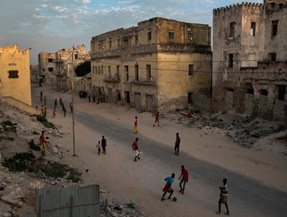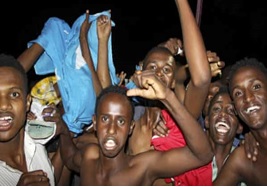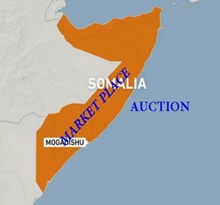By Isaac Muhammad
It’s hard to imagine western democracy succeeding in Africa, at least not in Somalia in a foreseeable time. Yes, Somalia broke ranks with the rest of the continent after it democratically elected its first president, Adan A. Osman after gaining independence. What ensued was a typical African stereotype of brutal dictatorship and civil war, resulting in the evolution of the ‘Somalization,’ a concept that is a disgrace to all Somalis.

Somalia has not had a fully functioning government since the fall of president Siad Barre in 1991. Since then, its population has endured long-running civil wars, insecurity, lawlessness, warlordism, terrorism led by religious extremism that indiscriminately kills innocent Somalis and others alike, and uncertainties that continue to date. Somalis’ hopes and dreams have been shattered election after election, and there is no reason for optimism for the 2021 upcoming election.
Somalis were too hopeful about their last two presidential elections, particularly the current President— Mohamed Abdullahi Farmajo. You may recall the phrase ‘Ar Farmaajo ii Geeya’ ‘Take Me to Farmaajo’ become sensational amongst the Somalis. It was the rallying cry that represented the Somali people’s joy and excitement with the election of President Farmajo. Sadly, he has not met the high expectations of Somalis hungry for sustainable governance and opportunities to provide for their families. Once again, the country is at a crossroads with elections looming and even more uncertainty than when he took office. While his administration has made strides in building or improving the government institutions and reforming the security sector, he failed to deliver on significant goals that would have constituted the kind of change expected after his election: widely anticipated one person one vote elections, the liberation of Al-Shabaab held areas, ratification of the provisional constitution, and the formation of the Constitutional Court to name a few.

According to many observers, including diplomats, and international organizations, the 2016/2017 election marked a milestone of corruption, bribery, and fraud. Foreign funds were flown into the country, and local businesses donated millions for bribing elders, State Presidents, politicians, and parliament members. The State Presidents single-handedly decided the parliamentary election outcomes. Those who follow the Somali politics know that, in Somalia, money has shaped the dynamics and nature of its politics and power, and it plays an essential role in who comes to power or wins elections.
The process of presenting items for bid, taking bids, and then selling them to the highest bidder aptly summarizes a practice that has permeated Somalia’s recent electoral experience—Election Market Place and Vote Auctioning. In Somalia, politicians spend millions of dollars to buy votes during elections, either for the parliamentary race or the presidency itself. In reality, these corrupt politicians’ main aim for power is to loot and make quick cash out of politics. In other words, to get back the money, they have spent on running for the post and earn their return on investment or at least reap the dividends.
Former US senator Robert Byrd once said, ‘It is money, money, money! Not ideas, not principles, but the money that reigns supreme in American elections,’. Rahul Gandhi made a similar statement about the Indian elections when he said, ‘If you do not have money, a family, friends, you cannot enter politics.’ Both Byrd and Gandhi underscored the influence that money has on political systems and democratic outcomes worldwide. Regardless of where the elections are held, we have increasingly witnessed the harmful impact that money can have on the political process and citizens’ ability to have their voices heard.
Yes, money is toxic to Somalia’s democracy and political process. But make no mistake, foreign money is not just destructive to a set of Somali principles—democracy and political process, but it is an existential threat to Somalia’s existence. Somali elections are won by those with deep pockets or those in collusion with corrupt foreign powers who see Somalia’s return to normalcy as a threat. Somalia’s current electoral framework does not protect election integrity as it doesn’t provide for universal suffrage, and there are no electoral laws, at least not for this election. As agreed, the election framework resulted from an ad-hoc process based on lengthy negotiations between the Federal Government of Somalia (FGS) and the Federal Member States (FMS), making election exploitation even more prominent.
The judicial system in Somalia is fractured, understaffed, and rife with corruption. Its authority is not widely respected, with state officials ignoring court rulings and citizens often turning to customary law or Al-Shabab rulings as alternatives. All factors mentioned above make it easy for those who are determined to interfere in the Somalia elections and tilt it one way or another.
Somalia is coming back to normalcy, and that scares many. The country has strategic regional importance, as it is the gateway to the Red Sea and the Gulf of Aden. Somalia enjoys proximity to the oil-rich Arabian Peninsula, directly impacting all seaports’ safety and future on the Red Sea and the Arabian Gulf’s national security. Somalia has a long coastline that offers access to the region’s fast-growing markets; therefore, it can influence vital shipping lanes from the Persian Gulf. Many consider Somalia a test balloon for the power struggle at international and regional levels. Foreign powers realizing the above strategic significance of Somalia are with their vile intentions determined to tilt the election balance in their favor.
Within this context, new geopolitical settings arise, in which some of the Gulf States formed alliances to avert other players keen on infiltrating the region. Also, the Horn of African States, realizing Somalia is no longer in a vegetative state, is now determined to ensure it never awakes or stays hypnotized at the least.

Somalia has emerged as a central battleground, with the past few years being the prime of its peak. Many foreign powers openly backed Farmajo’s government. In contrast, others intentionally undermined his success and supported their preferential political factions such as MPs and regional authorities to destabilize Somalia’s political stability or to use them as political pressure in their effort to secure concessions from Farmajo’s government. Somalia has been in the middle of a proxy war between foreign powers. This Proxy war has created or at least fueled political crises between Mogadishu and the regional authorities, undermining efforts to embark on central developmental tasks, political and economic reforms desperately needed, a unification of the Somali governing system. It kept Somalia at bay with its status quo. With the 2021 elections on the horizon, these foreign powers are primed and determined to throw their support behind potential candidates vying for the country’s top seat in the next presidential election 2021.
There is no nation that can exist without its patriotic public to guard and protect it. At stake in this election is Somalia, not a parliamentary seat or presidency. If academics, intellectuals, think-tank organizations, and the media don’t undertake constant vigilance to protect Somalia’s fundamental integrity and sovereignty during this election, Somalia, as we know it, will be anything but history. Each candidate must be vetted, critiqued, and the public must know who supports each candidate and under what conditions.The people must learn which candidate is complicit with Somalia’s enemy and which isn’t.
This year’s election is about more than a vision, ideas, and policies. It’s about more than economic growth, defeating Al-Shabab, and creating employment opportunities. It’s about more than governance, democratization, or justice, and equality. It’s about the mere existence of Somalia. It’s about ensuring Somalia is protected, so it doesn’t fall in the hands of its enemies. It’s about protecting Somalia’s sovereignty, unity, territorial integrity, people, and natural resources. Wake up, Somalia!
Isaac Muhammad
——
Isaac Muhammad is a writer and political analyst based in the US.His writings focus more on the Horn of Africa and Somalia in particular.Reach him at [email protected] and Follow him @Isaacmuhammad1
We welcome the submission of all articles for possible publication on WardheerNews.com. WardheerNews will only consider articles sent exclusively. Please email your article today . Opinions expressed in this article are those of the author and do not necessarily reflect the views of WardheerNews.
WardheerNew’s tolerance platform is engaging with diversity of opinion, political ideology and self-expression. Tolerance is a necessary ingredient for creativity and civility.Tolerance fuels tenacity and audacity.
WardheerNews waxay tixgelin gaara siinaysaa maqaaladaha sida gaarka ah loogu soo diro ee aan lagu daabicin goobo kale. Maqaalkani wuxuu ka turjumayaa aragtida Qoraaga loomana fasiran karo tan WardheerNews.
Copyright © 2024 WardheerNews, All rights reserved


